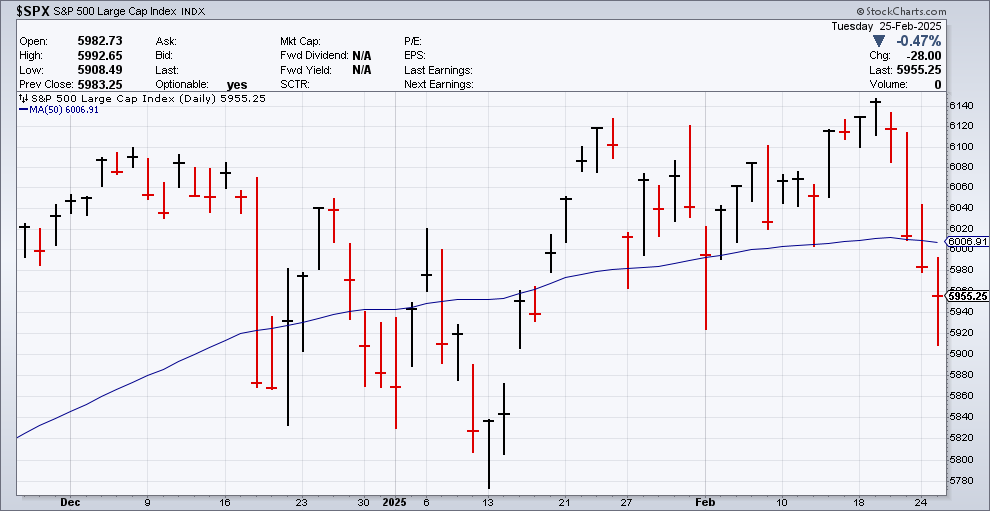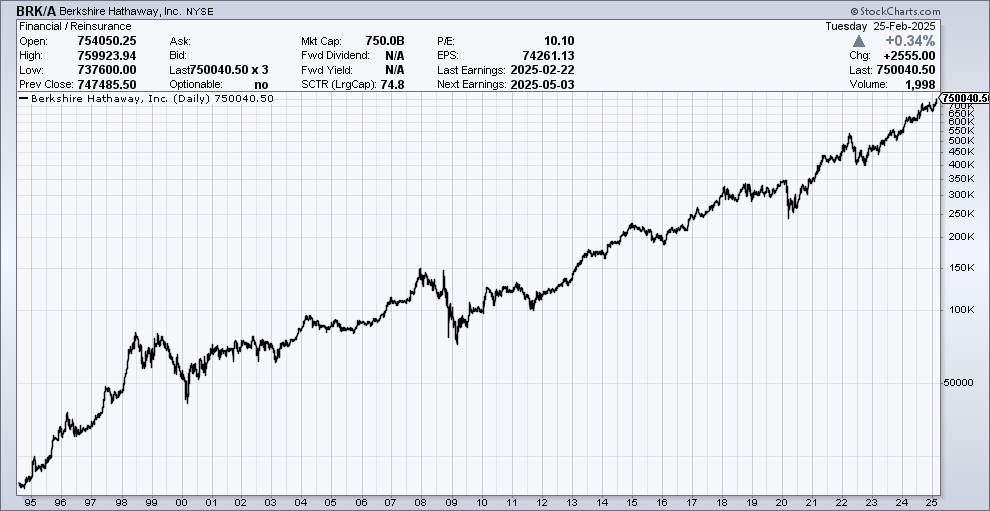CWS Market Review – February 25, 2025
(This is the free version of CWS Market Review. If you like what you see, then please sign up for the premium newsletter for $20 per month or $200 for the whole year. If you sign up today, you can see our two reports, “Your Handy Guide to Stock Orders” and “How Not to Get Screwed on Your Mortgage.”)
Wall Street has had a case of the jitters recently, and I can’t blame it. On Tuesday, the S&P 500 fell for the fourth day in a row. The index has dipped below 6,000, and it’s fallen beneath its 50-day moving average.
Of course, we should put this in context. Yes, the market is down, but that’s measuring from its all-time high from last Wednesday. Also, markets are naturally very volatile. The stock market pulls back all the time, even in roaring bull markets. There’s nothing unusual about this latest move. The combined loss is a little over 3%.
Still, there are some areas of concern. The economy could be getting weaker. The last retail-sales report was a dud. The jobs report was less than expected. Also, the inflation report came in hot. I noticed that the wage gains for January were the exact same as the inflation figure for January. In other words, every penny in raises was eaten up by higher prices.
Consumer Confidence Plunges
We got more bad news today in the Consumer Confidence report. The Conference Board said that the consumer confidence index fell to 98.3 for February. That’s down seven points from January, and it came in below Wall Street’s estimate for 102.3. If shoppers aren’t happy, then the economy will not do well.
This was the biggest drop in consumer confidence in more than three years, and it was the lowest reading since last June. Inflation expectations increased to 6%. That’s three times the Fed’s target. This comes at the same time that tariffs appear ready to go into effect. We really have no idea yet what the impact could be. The CEO of Alcoa said that it could cost 100,000 jobs in the aluminum industry.
“Views of current labor market conditions weakened. Consumers became pessimistic about future business conditions and less optimistic about future income,” said Stephanie Guichard, the board’s senior economist for global indicators. “Pessimism about future employment prospects worsened and reached a ten-month high.”
There’s another consumer confidence report put out by the University of Michigan. Last week, it reported a larger-than-expected drop of nearly 10%.
We’re currently in a fairly quiet period for economic reports. The new-home sales report is out tomorrow. Later this week, the government will revise the Q4 GDP numbers. While that’s an important report, Q4 is already a bit dated for our purposes. Markets move quickly but econ reports move slowly. A lot of guessing is done in the middle.
One interesting aspect of the market’s recent downturn is that it’s been heavily tilted toward riskier stocks. I like to track the S&P 500 High Beta Index which is a group of high-volatility stocks within the S&P 500. Over the past week, the S&P 500 has lost 2.8%, but the S&P 500 High Beta Index has lost 7.6% while the S&P 500 Low Volatility Index has gained 2.2%.
That’s a big spread for just a few days. It’s further evidence that investors are shying away from risk and that they’re looking for safe havens. I’ll also note that our ETF has been performing well versus the rest of the market in recent days.
In no sense are riskier stocks better or worse than conservative stocks. Instead, there’s a cycle to both and it reflects investor outlook. Sometimes investors become more willing to shoulder risk, and in other times, they seek shelter from the storm. Riskier assets had been doing well, but they got some pushback this week.
It’s not just stocks; we can see the same effect playing out in other markets. For example, bitcoin got dinged hard yesterday and today.
At the end of next week, March 7 to be exact, we’ll get the jobs report for February and that will tell us more about the economy’s recent behavior. The expectation that there will be fewer jobs six months from now rose to its highest level in over a decade.
The simple story is that Wall Street is bracing for bad news, but we don’t know if the upcoming news will be bad just yet. The market prefers to move before the news is certain. For now, Wall Street is adjusting itself to the possibility of bad news.
Buffett Has $330 Billion in Cash
Over the weekend, Warren Buffett released his annual shareholder letter. These are always fun to read. The 94-year-old CEO has a great ability to make complicated topics easy to understand.
What’s caught people’s attention is that Buffett’s cash holding has soared to more than $330 billion. A lot of commenters think that the large cash position reflects a bearish outlook from Buffett.
He was quick to allay those fears. Buffett wrote, “Berkshire shareholders can rest assured that we will forever deploy a substantial majority of their money in equities – mostly American equities although many of these will have international operations of significance.”
For the ninth quarter in a row, Buffett has been a net seller of stocks. Last year, Buffett sold $134 billion worth of stock. Still, Buffett has not been buying back his own stock. Perhaps he simply doesn’t see any compelling buys right now.
By the way, if you like Wall Street history, then today is your day. Several important moments have come on February 25:
The first Bank of the United States was chartered on February 25, 1791. Twenty years later, Congress decided by one vote not to renew the charter.
The first cabinet meeting was held on February 25, 1793.
On February 25, 1817, the New York Stock and Exchange Board was organized. (Sorry, but the Buttonwood stuff wasn’t that important.)
On February 25, 1862, The U.S. formed the Bureau of Engraving & Printing.
On February 25, 1863, Congress created the National Currency Bureau.
On February 25, 1893, the Philadelphia & Reading Railroad bankruptcy launched a Panic.
On February 25, 1901: JP Morgan created the first billion-dollar company, US Steel.
On February 25, 1913: The 16th Amendment authorized the first federal income tax.
That’s all for now. I’ll have more for you in the next issue of CWS Market Review.
– Eddy
Posted by Eddy Elfenbein on February 25th, 2025 at 6:35 pm
The information in this blog post represents my own opinions and does not contain a recommendation for any particular security or investment. I or my affiliates may hold positions or other interests in securities mentioned in the Blog, please see my Disclaimer page for my full disclaimer.
-
-
Archives
- April 2025
- March 2025
- February 2025
- January 2025
- December 2024
- November 2024
- October 2024
- September 2024
- August 2024
- July 2024
- June 2024
- May 2024
- April 2024
- March 2024
- February 2024
- January 2024
- December 2023
- November 2023
- October 2023
- September 2023
- August 2023
- July 2023
- June 2023
- May 2023
- April 2023
- March 2023
- February 2023
- January 2023
- December 2022
- November 2022
- October 2022
- September 2022
- August 2022
- July 2022
- June 2022
- May 2022
- April 2022
- March 2022
- February 2022
- January 2022
- December 2021
- November 2021
- October 2021
- September 2021
- August 2021
- July 2021
- June 2021
- May 2021
- April 2021
- March 2021
- February 2021
- January 2021
- December 2020
- November 2020
- October 2020
- September 2020
- August 2020
- July 2020
- June 2020
- May 2020
- April 2020
- March 2020
- February 2020
- January 2020
- December 2019
- November 2019
- October 2019
- September 2019
- August 2019
- July 2019
- June 2019
- May 2019
- April 2019
- March 2019
- February 2019
- January 2019
- December 2018
- November 2018
- October 2018
- September 2018
- August 2018
- July 2018
- June 2018
- May 2018
- April 2018
- March 2018
- February 2018
- January 2018
- December 2017
- November 2017
- October 2017
- September 2017
- August 2017
- July 2017
- June 2017
- May 2017
- April 2017
- March 2017
- February 2017
- January 2017
- December 2016
- November 2016
- October 2016
- September 2016
- August 2016
- July 2016
- June 2016
- May 2016
- April 2016
- March 2016
- February 2016
- January 2016
- December 2015
- November 2015
- October 2015
- September 2015
- August 2015
- July 2015
- June 2015
- May 2015
- April 2015
- March 2015
- February 2015
- January 2015
- December 2014
- November 2014
- October 2014
- September 2014
- August 2014
- July 2014
- June 2014
- May 2014
- April 2014
- March 2014
- February 2014
- January 2014
- December 2013
- November 2013
- October 2013
- September 2013
- August 2013
- July 2013
- June 2013
- May 2013
- April 2013
- March 2013
- February 2013
- January 2013
- December 2012
- November 2012
- October 2012
- September 2012
- August 2012
- July 2012
- June 2012
- May 2012
- April 2012
- March 2012
- February 2012
- January 2012
- December 2011
- November 2011
- October 2011
- September 2011
- August 2011
- July 2011
- June 2011
- May 2011
- April 2011
- March 2011
- February 2011
- January 2011
- December 2010
- November 2010
- October 2010
- September 2010
- August 2010
- July 2010
- June 2010
- May 2010
- April 2010
- March 2010
- February 2010
- January 2010
- December 2009
- November 2009
- October 2009
- September 2009
- August 2009
- July 2009
- June 2009
- May 2009
- April 2009
- March 2009
- February 2009
- January 2009
- December 2008
- November 2008
- October 2008
- September 2008
- August 2008
- July 2008
- June 2008
- May 2008
- April 2008
- March 2008
- February 2008
- January 2008
- December 2007
- November 2007
- October 2007
- September 2007
- August 2007
- July 2007
- June 2007
- May 2007
- April 2007
- March 2007
- February 2007
- January 2007
- December 2006
- November 2006
- October 2006
- September 2006
- August 2006
- July 2006
- June 2006
- May 2006
- April 2006
- March 2006
- February 2006
- January 2006
- December 2005
- November 2005
- October 2005
- September 2005
- August 2005
- July 2005



 Eddy Elfenbein is a Washington, DC-based speaker, portfolio manager and editor of the blog Crossing Wall Street. His
Eddy Elfenbein is a Washington, DC-based speaker, portfolio manager and editor of the blog Crossing Wall Street. His